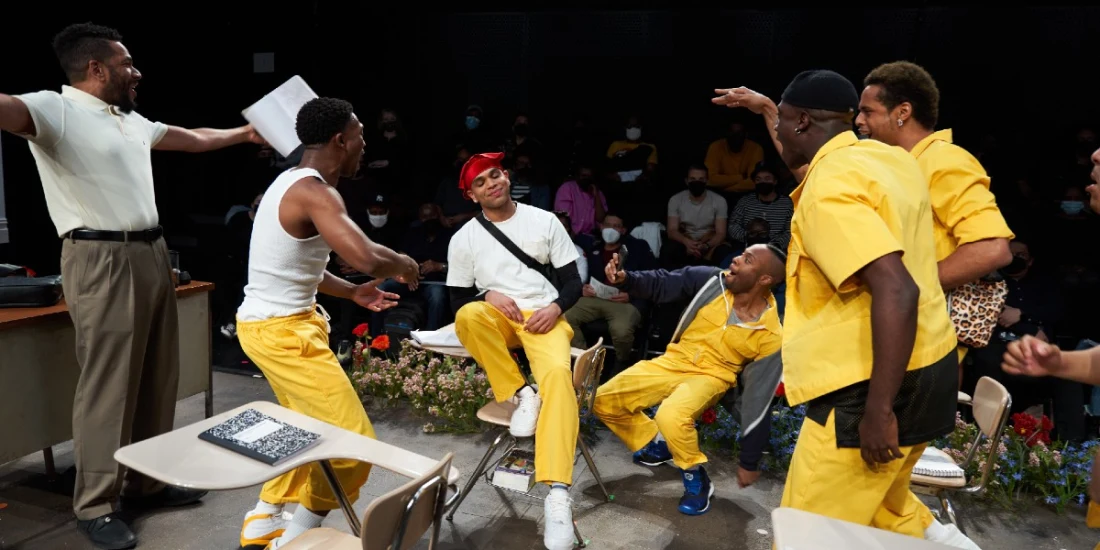'soft' review — in moving new play, Black boys struggle to bloom
One of the most well-known songs in the 1967 tribal love-rock musical Hair is a ballad called "Easy to Be Hard" whose lyrics are, "How can people be so heartless? / How can people be so cruel? / Easy to be hard / Easy to be cold." That song, sung by a woman to a man, points to how when it comes to masculinity, being hard and unfeeling is the default. And as dramatized by Donja R. Love's moving new play soft, the pressure to be hypermasculine is even more pronounced among Black boys, where hardness is an armor against a hostile world.
soft, currently running off Broadway at MCC Theater, takes place at a juvenile boarding school where underage Black teens with a criminal record are sent. A majority of the action is in an English class overseen by Mr. Isaiah (Biko Eisen-Martin), a newer teacher who genuinely cares about his students and their wellbeing. He encourages them to write essays about Othello and express themselves in ways that are natural to them, such as through poetry or rap verse. This is despite the school's head Mr. Cartwright (Leon Addison Brown) telling Isaiah to care less, because, he says, "the weight of what those boys need will crush you." Indeed, Eisen-Martin depicts Isaiah walking around with slumped shoulders, as if pressed down by that weight of his empathy.
Then when one student, Kevin (an instantly memorable Shakur Tolliver) kills himself, Isaiah can't help himself from caring more about his students, even if they try to push him away. Here, director Whitney White makes the most out of the small black box at MCC. soft is directed avenue style, with audiences on either side of the classroom. When the boys begin to fight with each other, the action is visceral, taking place just inches away from the audience. And when Isaiah tries to reach out to his students, such as to put a caring hand on them, they flinch and back away as if they've been burnt.
These boys are not even men, but they've been forced, by their tragic circumstances and by a society that already treats them like criminals, to harden. The stage, designed by Adam Rigg, is also surrounded by flowers of every color, as if to remind the audience that these boys are still just seedlings that need tending to. They need light and love.
The cast of soft is uniformly excellent. They have an easy chemistry with each other and are individually compelling. Love is adept at writing for their different voices, such as Dharon Jones as Antoine, who keeps to himself and is always doodling in his notebook, or Essence Lotus as Dee, who is gay and the peacemaker in the group. Each of these actors are able to fill in their characters, painting a full portrait of each boy through mannerisms and the different ways that they spit verse.
The cast makes soft a compelling new show, but at the same time, the play feels incomplete. For instance, Kevin's suicide drives the play, but not enough time was spent with him or seeing him interact with his classmates for his death to emotionally land. Instead, Love overrelies on dialogue to fill in those blanks, such as Isaiah saying that Kevin spoke to him before his death (though the scene is never shown), and Antoine saying he had a close relationship with Kevin, but the audience never witnesses that relationship. It risks turning this crucial character into a concept and a plot device instead of a full human being whose life was cut tragically short. Cartwright tells Isaiah, "lives are being saved because of you," but the audience never sees it. There's too much telling rather than showing.
It's tough to write a play about people trapped in a hopeless circumstance, especially because in real life, many Black boys in underfunded schools end up becoming another statistic in the school-to-prison pipeline. And public schools are so underfunded that teachers are already fighting a losing battle; the students can physically see from the torn textbooks that the institution that they are in doesn't care about them, so why should they pay attention in class?
In one scene, the show's highlight, Dee tells Isaiah, "My life ain't tragic. It's real good. I'm real good. Fab, actually. And I'm becoming the most fab version of myself every day. I smile more than I cry." Love is a poetic writer in the way he uses language, and it's a valiant effort to define Dee, and the other boys, through the lens of hope rather than tragedy.
But ultimately, soft betrays itself by overly focusing on the dark instead of the light. There are no real moments of compassion and caring until the last few minutes of the play, but by that point, that hardness had formed a crust, and it's too late for that bit of humanity and light to peek through. Yet soft is a poignant play that, with some more care and time, can grow into something beautiful.
soft is at MCC Theater through June 26.
Photo credit: Biko Eisen-Martin, Dharon Jones, Dario Vazquez, Travis Raeburn, Shakur Tolliver, and Essence Lotus in soft. (Photo by Daniel J. Vasquez)
Originally published on
